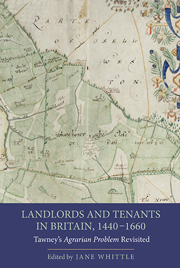Book contents
- Frontmatter
- Contents
- List of Figures
- List of Tables
- Abbreviations
- List of Contributors
- Acknowledgements
- Foreword
- Introduction: Tawney's Agrarian Problem Revisited
- 1 The Agrarian Problem, 1440–1520
- 2 Common Law and Manor Courts: Lords, Copyholders and Doing Justice in Early Tudor England
- 3 Negotiating Enclosure in Sixteenth-Century Yorkshire: The South Cave Dispute, 1530–1536
- 4 The Politics of Enclosure in Elizabethan England: Contesting ‘Neighbourship’ in Chinley (Derbyshire)
- 5 The Loss of Athelstan's Gift: The Politics of Popular Memory in Malmesbury, 1607–1633
- 6 In Search of the Scottish Agrarian Problem
- 7 The Transfer to Leasehold on Durham Cathedral Estate, 1541–1626
- 8 The Financial Rewards of Winning the Battle for Secure Customary Tenure
- 9 Risks and Rewards in Wasteland Enclosure: Lowland Lancashire c.1500–1650
- 10 Improving Landlords or Villains of the Piece? A Case Study of Early Seventeenth-Century Norfolk
- 11 The Agrarian Problem in Revolutionary England
- 12 Agrarian Capitalism and Merchant Capitalism: Tawney, Dobb, Brenner and Beyond
- Conclusions
- Select Bibliography
- Index
8 - The Financial Rewards of Winning the Battle for Secure Customary Tenure
Published online by Cambridge University Press: 05 September 2013
- Frontmatter
- Contents
- List of Figures
- List of Tables
- Abbreviations
- List of Contributors
- Acknowledgements
- Foreword
- Introduction: Tawney's Agrarian Problem Revisited
- 1 The Agrarian Problem, 1440–1520
- 2 Common Law and Manor Courts: Lords, Copyholders and Doing Justice in Early Tudor England
- 3 Negotiating Enclosure in Sixteenth-Century Yorkshire: The South Cave Dispute, 1530–1536
- 4 The Politics of Enclosure in Elizabethan England: Contesting ‘Neighbourship’ in Chinley (Derbyshire)
- 5 The Loss of Athelstan's Gift: The Politics of Popular Memory in Malmesbury, 1607–1633
- 6 In Search of the Scottish Agrarian Problem
- 7 The Transfer to Leasehold on Durham Cathedral Estate, 1541–1626
- 8 The Financial Rewards of Winning the Battle for Secure Customary Tenure
- 9 Risks and Rewards in Wasteland Enclosure: Lowland Lancashire c.1500–1650
- 10 Improving Landlords or Villains of the Piece? A Case Study of Early Seventeenth-Century Norfolk
- 11 The Agrarian Problem in Revolutionary England
- 12 Agrarian Capitalism and Merchant Capitalism: Tawney, Dobb, Brenner and Beyond
- Conclusions
- Select Bibliography
- Index
Summary
In The Agrarian Problem in the Sixteenth Century, R. H. Tawney described a wide range of possible constraints that customary tenure might impose upon lords and tenants. He noted that customary rents were normally fixed, and that during a period of rising land values lords could seek to increase their share of income from the land in a limited number of ways. They might overturn custom and persuade the tenantry to convert to leasehold, or retrieve the situation through increased fines ‘so as to get in a lump sum what he could not get by yearly instalments’. This last statement suggests that it was possible to increase fines to keep pace with the rise in market rents and that such increases could allow transfers from tenant to lord which would equate to the ‘lost’ rents. This chapter uses a detailed study of a tenant right estate in north-west England to demonstrate a number of points which have a more general application for other forms of customary tenure. It examines two aspects of the power struggle between lords and customary tenants on the Hornby Castle estates in north Lancashire. First, it identifies the potential income from the customary lands and quantifies the relative shares accruing to lord and tenants. This demonstrates how substantial the benefits were for manorial tenants who defeated their lords' attempts to raise rents and fines, and retained their tenures on customary terms.
- Type
- Chapter
- Information
- Landlords and Tenants in Britain, 1440-1660Tawney's 'Agrarian Problem' Revisited, pp. 133 - 149Publisher: Boydell & BrewerPrint publication year: 2013



